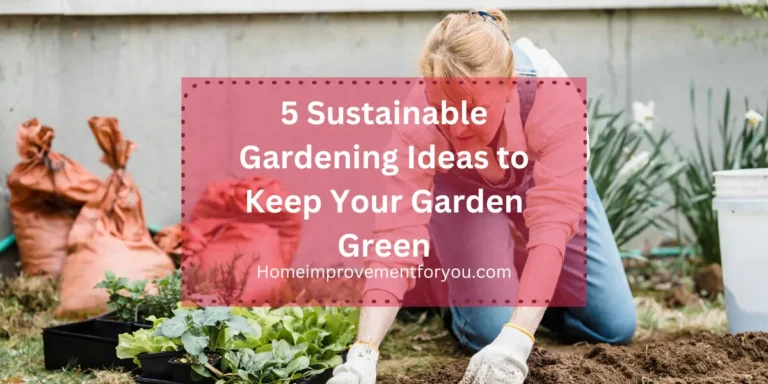Gardening is often seen as an eco-friendly activity, but without mindful practices, it can inadvertently harm the environment. By adopting sustainable gardening methods, you can grow a lush garden while reducing your ecological footprint. Here are five practical ideas to make your garden greener and more environmentally friendly.
1. Composting for Natural Fertilizer
Turn kitchen scraps and garden waste into nutrient-rich compost that promotes healthy plant growth.
Why It’s Sustainable:
- Reduces landfill waste.
- Eliminates the need for synthetic fertilizers.
- Improves soil quality and retains moisture, cutting down water use.
How to Start: - Collect organic waste like vegetable peels, coffee grounds, and garden clippings.
- Layer the waste in a compost bin or pile, mixing in dry leaves or shredded paper.
- Turn the pile occasionally and let it decompose into dark, crumbly compost.
Add this to your garden beds for a chemical-free boost.
2. Choose Native and Drought-Resistant Plants
Opting for plants suited to your local climate saves water and energy.
Benefits:
- Native plants thrive naturally with less maintenance.
- Drought-resistant varieties require minimal watering.
- Companion planting can deter pests and promote growth without pesticides.
Example: Combine pest-repellent marigolds with vegetables like tomatoes for a harmonious garden ecosystem.
3. Recycle Materials for Gardening Supplies
Give discarded items a second life as tools and decor for your garden.
Ideas for Recycling:
- Use cardboard as a weed barrier between rows.
- Turn egg cartons into seedling trays.
- Repurpose plastic bottles into watering cans or drip irrigation systems.
- Shred fallen leaves or old newspapers to make mulch.
This not only reduces waste but also saves you money on gardening supplies.
4. Conserve Water with Smart Practices
Water conservation is key to sustainable gardening.
Tips for Saving Water:
- Collect rainwater in barrels to use for irrigation.
- Place a bucket in the shower to capture water while it warms up.
- Use drip irrigation or watering cans instead of sprinklers to minimize evaporation.
- Mulch your soil to retain moisture and reduce watering frequency.
These practices ensure your garden stays hydrated without wasting precious resources.
5. Go Manual: Garden by Hand
Avoid gas-powered tools and chemical fertilizers to reduce your garden’s environmental impact.
What to Do:
- Use hand tools like shovels, rakes, and hoes for tilling and cultivating.
- Weed by hand instead of using chemical herbicides.
- Mow your lawn with a manual push mower to save energy and avoid emissions.
Not only is this better for the planet, but it also gives you a good workout!
Conclusion:
By incorporating these sustainable gardening ideas, you can create a thriving garden that’s as good for the environment as it is for you. From composting to recycling and conserving water, every small effort counts toward a greener future. Start implementing these practices today and enjoy the benefits of a truly sustainable garden!

